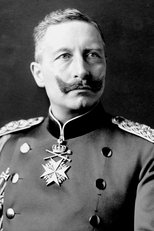Emperor Wilhelm II of Germany
See more on
Acted in
Atatürk, père de la Turquie moderne
2023
as Self (archive footage)
The Cultural History of Museums
2022
as Self (archive footage)
Leonardo da Vinci and the Bust of Flora
2020
as Self (archive footage)
From Atatürk to Erdoğan: Building a Nation
2019
as Self (archive footage)
Apocalypse: The Battle of Verdun
2016
as Self (archive footage)
Winston Churchill: A Giant in the Century
2014
as Self (archive footage)
Doomsday: World War I
2012
as Self (archive footage)
Wilhelm II. - Die letzten Tage des deutschen Kaiserreichs
2007
as Self (archive footage)
Zeppelin - Das fliegende Schiff
1987
as Self
A Wall in Jerusalem
1968
as Self (archive footage)
The Guns of August
1964
as Self (archive footage)
Paris Nineteen Hundred
1948
as Self (archive footage)
Forgotten Treasure
1943
as Self (archive footage)
The Fight For Peace
1939
as Self (archive footage)
Huis Doorn III
1932
Doorn Juli 1931
1931
Some of the Life of Our Emperor in Doorn
1928
The Fall of the Romanov Dynasty
1927
as Self (archive footage)
From the Heyday of Emperor Wilhelm II
1926
Kaiser Wilhelm in Eijsden
1918
Ahlbeck. Wilhelm II Visits a Working-Class Children's Home
1914
as Self
Arrivée en gondole des souverains d'Allemagne et d'Italie au palais royal de Venise
1899
as Self
Seine Majestät von Bethlehem zurückkehrend
1899
as Self
Marktplatz in Beirut
1899
as Self
Landung in Haifa
1899
as Self
Kaiserparade in Damaskus
1899
as Self
Einfahrt in Konstantinopel
1899
as Self
Emperor and Empress of Germany
1899
Départ en gondole de Leurs Majestés
1898
as Self
Kaiser Wilhelm II. beim Besuche der Vulkan-Werft in Stettin am 4. Mai 1897
1897
as Self
Görlitz : revue devant Guillaume II et Nicolas II
1896
as Self
III. Défilé de hussards devant Guillaume II
1896
as Self
Guillaume II et Nicolas II à cheval
1896
as Self
The German Emperor Reviewing His Troops
1895

























